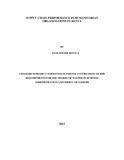| dc.description.abstract | Supply chain performance is critical during emergencies, in an effort to prevent loss of lives and
property. Despite this, many studies have focused on supply chain performance in manufacturing
and commercial organizations whose focus is to deliver value to customers in order to make
profit. The main objective of the study was to address this gap by establishing factors affect
supply chain performance in humanitarian organizations in Kenya. The researcher adopted a
descriptive research design and selected 40 respondents out of total population 70 humanitarian
organizations through systematic sampling. Data was collected through structured questionnaire
and key informant interviews. Data was analyzed using SPSS version 17 through application of
descriptive statistics, cross –tabulations and binary logistic regression. Half of humanitarian
organizations have non performing supply chains. Only one third of supply chains met deadlines,
while half were flexible to changes in project demands. The skewed supply chain performance
was largely attributed to financial limitations, government bureaucracy, infrastructure challenges
and environmental limitations. Further analysis using cross tabulation and chi-square revealed
that financial limitations, government bureaucracy, infrastructure challenges, environmental
challenges, procurement delays showed statistically significant association with supply chain
performance. The study found no significant association between cultural and other contextual
restrictions with supply chain performance, except in circumstances where staff deployment was
concerned. On the effect on various factors on procurement performance, the study found that
organizations that experienced government bureaucracy and infrastructure challenges were
several times more likely to have non –performing supply chains. Other factors with significant
effects included, resistance to staff deployment, financial limitations and diversion of supplies.
The study recommended custom made all inclusive supply chain packages for humanitarian
organizations and policy level attention to government restrictions and infrastructure
improvement. Suggestions for further research include; comparative study targeting corporate
sectors, development projects and specific emergencies in other geographical areas. A wider
study encompassing all stakeholders’ views and operations research are also recommended | en |

